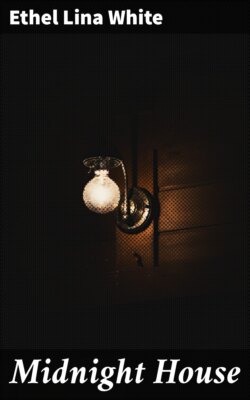Читать книгу Midnight House - Ethel Lina White - Страница 6
На сайте Литреса книга снята с продажи.
—III—
ОглавлениеTable of Contents
While their parents raged like bulls in combat, the General's son and the plumber's daughter fell deeply in love. Marion Brown was sweet, simple, and a perfect type of natural blonde beauty, but as far as the Tygarth family was concerned, she was mud. From the first kiss, the romance was doomed to follow the tragic tradition of Romeo and Juliet, for the worthy Browns—smarting from wounded pride—turned their daughter into a virtual prisoner, to keep her from meeting her lover.
For two years she never went out alone. Clement was powerless, since he was dependent on his father for every shilling and on his mother for the care which kept him alive. Forbidden to write to his beloved, he used to stand at his window, to watch her come and go on her daily walk.
Although it was so long ago, Mr. Spree, the lawyer, felt slightly choky at the memory of that white fading face behind the glass. Thwarted of love, the young War-hero's health grew steadily worse, and he died from collapse during an attack of influenza.
His parents were broken-hearted and possibly conscience-stricken. As No. 11 had become a place of hateful memories, the General decided to shut up the house and go abroad.
Thus was the plumber's prophecy fulfilled...
On that misty November morning, nearly twelve years later, the lawyer recalled the General's letter of instructions. No. 11 was to be sealed up and remain unopened, pending further orders or the owner's return. Upon a specified date, he was to assume the death of his client and open up the property.
"I wish you to be personally responsible for locking up the house" [wrote the General]. "We are leaving nothing of value behind and there are no animals. It is intolerable to contemplate some inquisitive bounder from an Estate Office prying into details of our private life. We are moving out early tomorrow morning, and hope our departure will be secret. We have suffered too deeply to endure further painful publicity."
Although his instructions were definite, the lawyer could not resist ringing up the General, to urge the sale of the property. He was nearly blasted over the wire by his client's rage.
"My letter stands," he roared. "No sale. Haven't you the gumption to realise the last thing I want is a pack of strangers let loose in my house, making a catalogue and passing remarks on my furniture? I regard the place as dead money."
Mr. Spree could congratulate himself that he had acted with none of the traditional Law's delay. That same afternoon, he unlocked the door of No. 11 with the key enclosed in the General's letter and went inside, to carry out his instructions. The house was dark, as many of the windows were already latched and shuttered. With meticulous care to avoid taking notice of his suroundings, he went from room to room, to make sure that every fastening was secure. While he waited in the hall for the Corporation employees to cut off the water and check the electric-light meter, he read his newspaper, to prove his lack of curiosity.
Later, when he was alone again, he locked the back door, which opened on to the area. Then, with a sense of drama, he walked out of the front door—reflecting that his would be the last foot to cross the threshold for many years.
The next morning, the windows were boarded up from the ouside, and both locked doors were double-chained. Even the chimneys were blocked, to prevent daws from building inside the pots. When all was finished, the lawyer remarked that the house would need a Houdini quality to wriggle itself free from its bolts and bars...
And now—within a fortnight—it would be opened again.
